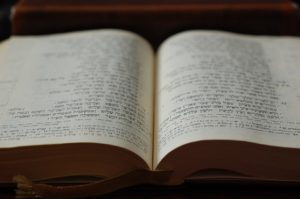 The Smallest Detail Will Not Pass
The Smallest Detail Will Not Pass
During his ministry, Yeshua stated “the smallest detail would not pass.” What is the smallest detail he was referring to? Why would he make such a statement? Let’s learn together.
The Jewish Man
As a Jewish man with a short three years ministry, Yeshua’s time was precisely used to make the most impactful public speeches in history.
He had no intent to abolish the law and made sure to clearly teach that he didn’t come to abolish the law or the prophets. In an effort to drive this point, Yeshua said:
For truly I tell you, until heaven and earth disappear, not the smallest letter, not the least stroke of a pen, will by any means disappear from the Law until everything is accomplished.
Matthew 5:18
The book of Matthew was originally written in Hebrew, and later translated to Greek. It is from the Greek translations that we got our modern translations to English, Portuguese, etc. During the Greek translation of this event, several different meanings were injected in an attempt to translate as accurately as possible the item Yeshua was referring to.
Some translations went with "the smallest letter" others with "the smallest detail" and one went with "not one iota." Iota is a Greek word derived from the Hebrew letter Yod.
The Yod
The letter Yod is the tenth and smallest of all letters in the Hebrew Aleph-Bet. It is also the most frequently occurring letter in the Scriptures.
When Jacob was renamed from Ya’akov to Yisrael, the only letter that remained from his former name was the letter Yod.
The Hebrews listening to Yeshua, understood immediately that he was saying: “not even the smallest detail will be eliminated from the Torah.”
The non-Hebrew speaking people could have missed another important part of what was said.
Understanding More Completely
In the Aleph-Bet, a small ascending prong is called a Kots of a Yod. It can be considered “The least stroke of a pen.” Often signifying humility, a Yod was adorned with a small ascending prong that points to God. In the Jewish scribal arts known as Soferut, a Torah Scroll is invalid (possul) if it lacks even this serif of the Yod (Menachot 29a)
![]()
Yeshua’s message carried at least two points: First, that not even a yod, the smallest letter, would pass. But also, that the same yod was vital to the validity of the Torah. Otherwise, without the “kots of a Yod” the entire Torah would not be the complete word of God and would consequently be considered invalid.
The Message
This teaching tells us that it is in the smallest and sometimes “insignificant” that the LORD’s power is perfected. We can also extract from this message that the LORD ordained us to keep his word intact.
He assured us that nothing from the law will pass until everything is accomplished.
It is easier for heaven and earth to disappear than for the least stroke of a pen to drop out of the Law.
Luke 16:17
Suffice to say, the law is here to stay.
The LORD’s Perfection
The numeric value of the word yod is 10. The number 10 is a number marking completion and order. The Hebrew word for “complete” is Shelemut (שְׁלֵמוּת) as shown on:
- 10 things created on the first day and 10 things created at the end of the sixth day of creation.
- There were 10 generations from Adam to Noah and 10 generations from Noah to Abraham.
- The Exodus of Egypt happened after the 10 plagues.
- God gave us 10 Commandments.
- Yom Kippur (The Day of Atonement) happens after 10 days of Awe – from Tishri 1 to Tishri 10. The 10th day is Yom Kippur.
Going Deeper
The letter Yod is the first letter of the name YHVH (יהוה) and the first letter of the name above all names, Yeshua (ישוע), indicating its preeminence. It’s also, the first letter for the four names given to the Jewish people
Ya’akov – Jacob – יעקב
Yisrael – Israel – ישראל
Yehudim – Jews – יהודים
Yeshurun – Jeshurun – ישורון
Conclusion
When Yeshua said the smallest detail will not pass, he means it completely. It’s time to embrace the Bible as written and allow the Ruach Hakodesh (Holy Spirit of the LORD) to teach you the truth.
If you are not considering the law of the Father as still valid and in effect law, you need to reconsider and reassess who you are actually following. And if you are considering and keeping the law, does this mean that you should grow a beard, follow rabbinic laws and appropriate Jewish culture? Absolutely not. This simply means that the Father wants to take you, break your preconceptions and build you up the way that only He knows how. And that, this maybe the smallest – but vital – detail that you may be missing.
Scriptures have very recurrent themes. One of them is the idea that the LORD’s greatness causes the apparent insignificant or smallest person, opportunity or thing to become Holy, Blessed and Important.
Shalom!
Rabbi Douglas
